The Father Is So Surprisingly Close That I Stand Astonished. When I Saw How Much I'm Not Hearing Him
The Father is so surprisingly close that I stand astonished. When I saw how much I'm not hearing Him speaking, I asked and He came to me. Now I feel renewed, strengthened and lifted up. There's nothing I fear now. :)
More Posts from Bernatk and Others
Frankenstein? You Certainly Have No Idea
A while ago I wrote a similar post about Bram Stoker’s Dracula, where I explored how we’ve gradually departed from the original concept and eventually turned the whole story inside out--the way it’s usually believed to be today.
Horror and genre fiction in general are looked upon as solely entertaining literature. It is best represented by enormous fandoms around horror stories that are really the shallow water of the stream of art--yes, I’m referring to Stephen King.
Although is it not supposed to be more? Shouldn’t horror really be more than a good fright? Obviously I ventured out to write this post because I strongly believe horror can have more profound dimensions and it should. Actually, my opinion is mainly informed by Stoker’s Dracula and Shelley’s Frankenstein (and a good portion is a result of reading Poe extensively in my teen years, as it shows in the post later).
Let me begin by explaining a bit about contemporary horror’s genesis. As a branch of literature it has very little to do with books, it is only an indirect continuation to the tradition. Today’s horror comes from a set of movies, some of which were book adaptations or remotely inspired by them. Actually one name is a recurrent theme here: Bela Lugosi, a.k.a. the king of horror--much more so than anyone would have thought. His version of Dracula has proven more enduring than the written one, so the underlying themes of Stoker’s novel, which even concerned the metaphysical at times, are lost, quite tragically. Also, the popular image of Frankenstein’s monster comes from the 1939 Rowland V. Lee movie Son of Frankenstein. The shape of the creature, its mindlessness, the castle, the assistant--every bit people associate with Frankenstein is a direct result of the movie, hardly any of which actually features in the novel.
A written genre originating from a visual one is encased in the limitations of both--what could not be visually understood won’t appear, and the same applies to the written part. It is an almost unimaginable thing but originally these horror stories barely ever showed the horror. “Why, we have that today,” the ignorant reader might say but the horror of old times was not filled with the today commonplace suspense and disgust elements.
In this post I focus on the method of Shelley in Frankenstein: Her approach was what we would today call the purist. Her novel embodies horror--the dictionary’s definition of it actually. She only ever tells as much about the monster that it exists, reluctantly adding that it’s too hideous to behold and once dropping that its hand resembles that of a mummy. The main instrument of this story is a very long line of deaths but only in the purist spirit, as well.
A prolonged prologue commences with establishing the members of an extended family. They are talented, intelligent, wealthy, charitable people, who are just the dream of the era. After individually stating about every relation how enviable and admirable they are, the monster is briefly introduced. No lightning is involved here, only the statement that Victor Frankenstein, the visionary, somehow figures out how to bestow life upon things and then, once the monster is created, he instantly regrets it and falls into a state of mental breakdown over the realization of how unhallowed his work is. The monster then lives alone for a while, gradually comprehends that he is frightening to humans and feels that he is forced into a perpetual state of solitude, which he loathes more than anything--so much so that he will burn down the entire world if necessary to get himself a companion. And that’s about it. The monster asks Frankenstein to create him a mate but as he refuses he decides to avenge him as the creator of his desperation through killing everyone he holds dear. Enter the death of all characters...
The horror is how Frankenstein watches everyone he loves being killed at the unstoppable hands of his own creation. His guilt and reflections at it are horror. He is horrified. Horrified. He--along with the invested reader--is not exactly startled, nor disgusted, but profoundly horrified.
But there’s more to this story than just being the original horror. I explored that dimension only because of the framework of today’s horrible, genre-redefining novels.
As contemporary horror tries to grasp what visually equates horror, all content is lost. Shelley operates with what Poe designated as the horror-writer’s most powerful instrument: “The death of a beautiful woman, is unquestionably the most poetical topic in the world.” In human relations the most extreme loss is that of one’s child but the loss of someone one loves tenderly comes in as a spectacular second, with a much more elevated pathos.
The reason this is preferred by Poe and a myriad of authors is that a parent-descendant relationship is a natural one, where choice has roughly no role, whereas in a romantic relationship, while having a powerful natural component, active choice is central. This is why a parent losing a child usually goes with the line: “A parent should not live to see their child die,” when a lover’s loss comes with: “They were taken from me.” So, while the first kind of death evokes the more profound pain, the second one is the more aesthetic. It is a better case of antagonism: what one actively binds themselves to, pledges to unite their identity to, is actively deprived from them by a second actor, thus their willing choice for whom they would value most highly in life is irrevocably undone.
The peak is then the death of a beautiful woman but it can only be a real peak if the beauty of that woman is fully realized.
An interesting juxtaposition can be made here between the book’s model and the contemporary one. The book emphasizes multiple faculties, such as intelligence, a charitable nature, intuition and nobility of character, whereas today’s model is derived from the passions of the flesh. Contemporary theories favor a simplifying approach, which marks the core of all traits the sexual of a person. However, Frankenstein is a great example of how it used to be a valid action to discrete the sexual, the intellectual and the emotional. Today it would be called repression of the true motives (the sexual), since all the faculties associated with beauty are just expressions of the deeper, truer core of identity. Feminists of the past would have pointed out that the death of the beautiful woman symbolizes Shelley’s vision of the intelligent, competent woman’s fate, as she is determined to die, even by the principles of literature (or Poe). Today’s most progressive feminists, though, would confine this story to the literal body of women, however, not only a story but women, and all people, are much larger than bodies.
But Frankenstein is not the perfect novel. Whereas it succeeds at many things and has its outstanding merits, it does fail at anticipating what the reader can guess, as Frankenstein misinterprets a supposedly enigmatic line and prepares for his own death, when his soon-to-be wife is threatened. Sadly the target is so obvious that it’s impossible to believe what the protagonist believes to come next but, as I have stated before, this is a completely marginal element of the story and perhaps even Shelley didn’t want to make it a really elaborate twist...
All in all Frankenstein is the beacon of the lost genre of horror. But beside its literary quality it might also be a reminder to the readers that there used to be a way of thinking that thought it possible to abstract from the material.
How to fail university
First of all, attend a university, which you are most certainly not fond of. Work really hard but not as much as you see fit, instead push as hard as expectations require, and burn out. Once you're incapable of doing anything further, it won't be hard to fail enough tests to fail several subjects. I know you're smart enough to get to the exams, even if you were a total mess when you had tests. Once you're miraculously facing a couple of exams (it's wondrous because you haven't yet failed by merely the tests), make sure you're extremely busy with unrelated business and when it comes to the very week of the exams, procrastinate! More than ever in your life! More than altogether in your life! Then, when you've done enough procrastination and that voice in your head is shouting, that you should study, do some studying but pay attention to do it very skin-deeply. Okay, you're at the exam and you've completed an utterly half-ass process of learning, a.k.a no learning at all, you can be at ease, for there's a fair chance, that you'll fail. Every single subject. One by one.
There you have it, my secret recipe for failing uni.
This is an ironic approach of telling my story at how I've performed so far. OK, maybe the end was just a predection, but a very realistic one. My point is not to gain some of yourvaluablepity, and definetely not to set up an example. Well it is in fact an example but not one to follow.
What I'm trying to say with this excessive and rather sarcastic post is hidden in the very first sentence. Do not EVER give in to reasons, that lack the consideration of YOU. Every single person is unique and has a life, that has the potential to be full. However, this diversity naturally implies the pointlessness of schemes. We can't live by the guidance of movie-themes or advices of people we look up to (or sometimes ones, that we don't even look up to). We have to find our own way. And the path, that we'll follow, will eventually determine, whether we arrive at our destination or not.
Our primary aspects of considering careers are its profitability and the likelihood of being employed. But these won't make our lives worth living. Either we accept it, or not, the truth is, that we spend a major part of our days in the little boxes we call workplaces. And it matters enermously if it's right for us. And not in a sense of us being able to provide our family with everything. Our profession has to make us happy. As St. Augustine said "Love and do what you will.".
My conclusion will be hard for some of you to swallow but please bear with me. The Bible says, that we shouldn't worry about our needs for they will be fulfilled be the Divine Providence of God. And this is what makes me calm while I rerender my plan for the future. My faith gives me confidence to say all this. This is why I'm not afraid to say, that there's a certain destination I aim for. This is why I'm on the side, that says you can bravely follow your dreams. Because when you're convinced, that your dreams are justified by the Great Maker, you fear not what is yet to be faced.
What is Brendan Eich?
Nearly everyone has heard of how Brendan Eich, Mozilla's former CEO, stepped down because of a scandal around his contribution to an organization that sought to ban gay marriage. Conservatives and liberals have been engaging in heated debates on this matter and this post isn't to determine who's right or who's wrong. What it is meant to discover is the phenomenon itself.
The interpretations I've encountered are:
#1: Opposing liberals meant that Eich made a strategically wrong step. Admitting to failure, he decided to step down.
#2: His personal standpoint went against the very mission of Mozilla, which was not creating profit but spreading openness, freedom and such with a diverse community.
These arguments. however, don't directly lead to the actual consequences. The reasons why these are misleading, inaccurate arguments are:
#1: Even though in politics and everyday life we all try to bring our own views to victory, a liberal couldn't oppose Eich. A liberal answer to his donation would have been nothing but total respect. That is because such a reply would be in favor of diversity, although all-inclusive includes the ones, who don't agree even with inclusiveness. There are many forms of liberalism but none of them would scold Eich's contribution to that organization. In summary, he couldn't oppose liberalism in a way that would lead liberalism away.
#2: Brendan Eich made his contribution as an independent individual, back in 2008. Now he spoke against everything that could oppose the gay society. He realized that holding up such views would definitely infringe Mozilla's mission. Still, his altered position promoted diversity. One could say that he is responsible for the collectivity of his actions but he actually faced this past act of his, trying to make it fit to the company's mission. Opposing Eich would actually mean failing this mission because at least toward him they close their imaginary gates and would exclude him.
What I'm trying to articulate is that there cannot be any idealistic reason to support his stepping down. On what grounds do many support it then?
(Before making my thesis, I want to note, once more that I'm not saying Eich was right or wrong when donating to the anti-gay organization, neither the same about his stepping down. Now back to the point...)
What this case tells us is that though people sympathize with liberalism or communitarianism or anything else, most of them don't actually belong to them. Eich's opposition (the kind, which doesn't only have a different view but instead is actively against him/agrees with his resignation) doesn't consist of liberals or any other group of idealists, instead of people, who may sympathize with them but they themselves are essentially different.
Carl Schmitt wrote that the main function of politics is to distinguish between friend and enemy. Schmitt wasn't a liberal--more importantly he wasn't an idealist but a realist.
Eich's opposition makes an enemy out of him. They called on Mozilla users to uninstall their browser and stop using their products. They took up a fight against him with smart methods, ones, which were enough to make the continuation of his being a CEO impossible.
It's not a question whether or not Eich was right but whether or not he is a friend to us. Not a liberal community opposed him but rather a realist one that, at best, only serves a liberal community. They can sympathize with liberals but they can't be them.
The reason why I thought this whole matter important to see is that it's not the age of idealism any more. Of course I can't deal an absolute in regards of this because the political sphere is very mixed and while there are realists in it, we can just as easily name another huge group of idealists. My ultimate point is that this presently emerging trend is, contrary to popular statements, not liberalism, or any other form of idealism but realism instead, where one can't rely on rights or morals, only on the inclinations of those, possessing power.
"What direction - Life begins at the intersection"
It's a Switchfoot quote. OK, I know they didn't actually invent the line but it's in one of their best songs: Faust, Midas and Myself. This piece of music is more literary, than most of the contemporary novels. I'm not gonna add much about the lyrics but the basic question which it implies is whether our goals and dreams are well-thought-out - if we could have them all.
Recently I've been given/offered grand opportunities. One is: two contract offers from a good-named publishing company. It was sort of a before-the-right-time because I decided to continue perfecting my book. I don't even know why I tried to catch their attention. But the amazing thing is, that it worked easy as cake. WOW! Though there's clearly not much that I did. The whole situation is only a link of favourable but un-controlled events. For which I am really grateful.
I must admit, that it doesn't make me special, no matter how much I feel that way. At best, it's a special piece of art, which is worth the mention. But me? Out of the picture. Life often brings us to unprecedented intersections. We are to choose the direction. But do we choose wisely? No. (It was a very strong, firm no...) You know, we could be anyone. Life has no limits at all. Our beliefs, however, can lock us away from the best existing possibilities. We really do believe, that we can't be big people, successful, or simply happy. We let the popular concept take over: we are under too much weight to be getting anywhere in our lives. But in fact, there is no place, nodirection, which we could not choose. I guess the metaphor is as complete as ever...
If it leaves open questions, then answer them, it's on purpose!
Randomness rules!
word
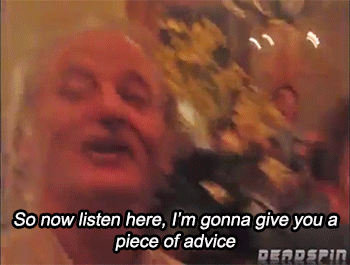
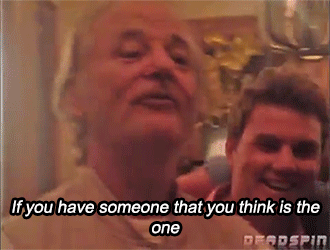

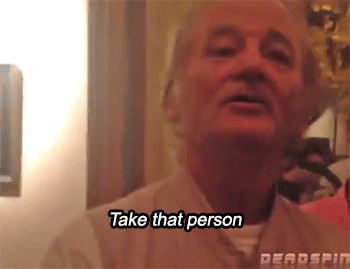
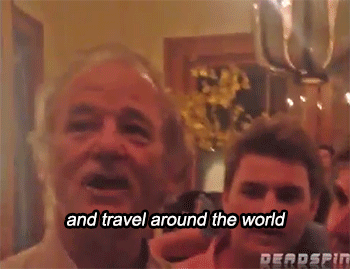
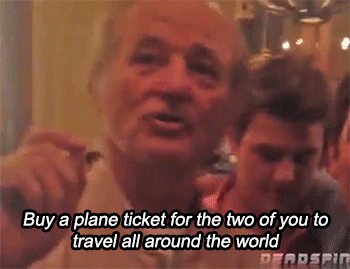
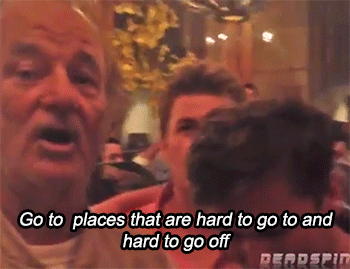
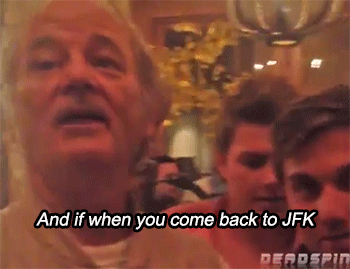
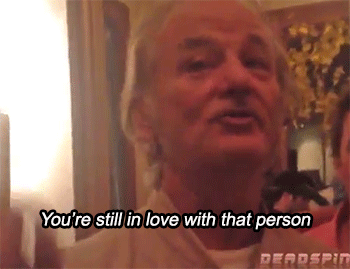
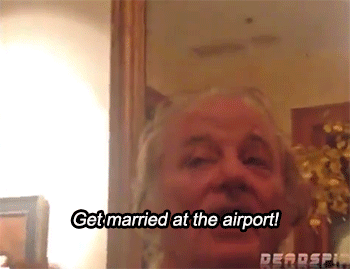
Bill Murray Crashes Bachelor Party, Gives Awesome Speech - Video
First of all: get some sleep.
I am going to offer you two arguments. One of them is as rational as it gets and the other one has a personal example.
#1: As much as it's necessary to realize how things change, how everything's transient and how life can get fairly random, it's way overrated.
HIMYM is a sitcom and it's unjust to set high standards for it, I understand that. But I think my expectations should have been met by it because I didn't want it to end with an ultimate moral that somehow makes everything click. Of course no show can run without standing for something, however irrelevant or stupid that thing might be.
The arc of HIMYM and especially the finale really focused on the dynamics of the core five characters but other than that, the dynamics of life. It is a good observation that things are in motion and that cruel things will happen to everyone, undeniably and unavoidably. I further say that it is an important observation, since one may find him-/herself in the false hopes that maybe a good state of things, a good part of life may be preserved. That way of thinking ought to be reformed, illuminated, as it would eventually lead to bitter disappointment. So I accept the value of this point.
On the contrary, it is inadequate. The lead singer of Switchfoot, Jon Foreman, once said it in an interview that today's people have lost their connection with death and danger. If you read Hemingway, many of his characters meet their ends at some point of the story and it's really not a big deal (in the sense that it's not the end of the world, though death's always a big deal, even in Hemingway's works). I was really surprised by the way Robert Wilson teased the woman, who just shot her husband about how their relationship was already pretty bad anyway in The Short and Happy Life of Francis Macomber. It wasn't a weightless, irrelevant thing, of course, even so, it was the climax of the story, yet Robert Wilson's reaction was different from how, for one, I would react if I saw someone die. This isn't because of Hemingway's particular relationship with violence but because of a more general concept of life--one that's changed over the course of time.
Our culture has been softened so much that it'd be enough for us to realize that things come and go in life. It is treated as a great revelation because we live in much greater safety and we're pretty sure that our safety will not be seriously endangered and when it is endangered in someone's life, we consider it radical. We're so blinded by our security that we don't see past the possibility of change, whereas it would be mandatory to know how to act in case life should bring a wave of it toward us.
I say that a good story can't stop when reaching the so popular phrase of "the perfect imperfection of life" but rather it should offer some sort of remedy. To try to give us options and hopes is what I see as the primary mission of a writer or director.
#2: Hard things don't always happen to us but they are often made by us.
As much as Ted couldn't save his wife, Robin and Barney were completely responsible for the end of their marriage. One could argue that it was "written in the stars" but their personality traits did not determine how their romance will conclude.
Henri Nouwen wrote: "In the depths of my being, I meet my fellow humans with whom I share love and hate, life and death.". Everybody has certain flaws that gradually alienate their partners or that make being married to them difficult. These flaws differ from person to person but in one form or another, they are unquestionably there. It is also true that everyone shares the ability to love.
It's always an invalid defense to say that one was not a good match because of certain qualities or the lack of them and thus the divorce. I wouldn't argue against saying that someone wasn't the one but that should be realized before marriage and not years into it, though it's a sidetrack and I should return to my point...
Let me elaborate by pointing out something in my own life. I've been in a romantic relationship for over three years now. I intend to marry this girl sooner or later and I also intend to be nice to her. Furthermore I'm madly in love with her, what's not a bad thing once you want to marry someone. But there are moments, much like instances of insanity, when I feel distant from her. Sometimes certain traits come into focus that are flat out antagonistic in me and her. I have felt the capability of breaking up. If I ever wanted to end our relationship, there would have been moments for that. Of course, I never wanted to break up with her, that's why we're together, but my point is that I understand how it is in everyone to end a romantic relationship, as I know it is in me, too, whereas I also see that it is also in everyone to hold on to someone, as it is in me, just as well, and as I intend to live my life.
So I say that divorce is not an article of change that happens to some people, inasmuch as it is based on personality traits.
I never made it an issue whether or not the show would have a happy end or take a more dramatic turn. (Personally, I prefer sad ends--well, not in all cases.) And I know it's nonsense to say that a TV show is wrong, especially to say that a sitcom is wrong--but How I Met Your Mother is wrong :) JK
PS: I say it again, have some sleep. Seriously bro.
The famous sit-com, How I Met Your Mother, reached its end finally. It’s been greatly anticipated by many and is currently being hated and scorned by even more. I’ve heard countless negative comments on it but as most people aren’t philosophers, nor particularly good at deeply analyzing films,…
I mostly write. Read at your leisure but remember that my posts are usually produced half-asleep and if you confront me for anything that came from me I will be surprisingly fierce and unforeseeably collected. Although I hope we will agree and you will have a good time.
213 posts
